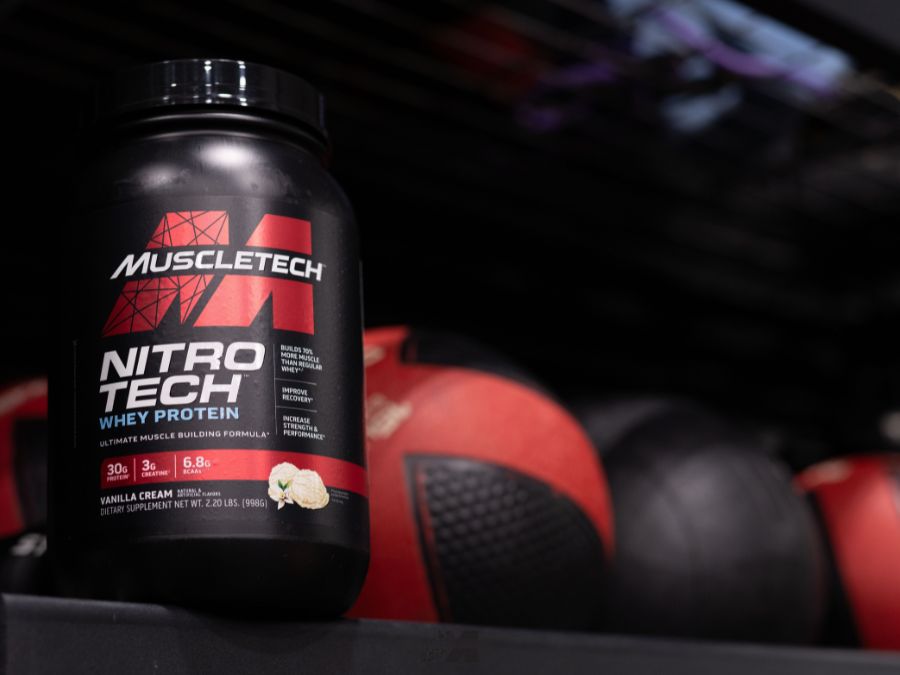Having a fast metabolism can certainly have its benefits. However, without the proper nutrition and workout routine, gaining weight can be incredibly challenging — not only to accomplish but to sustain.
Metabolism is the process by which the body converts food into energy. Those with a high metabolism tend to burn calories at a faster rate, making it harder for them to gain weight.
Gaining weight and building muscle mass can be tough for those with a fast metabolism. If you're reading this article, you must know the struggle.
You can load up on high-calorie fast foods, sweets, chips, cookies, and more...However these foods are full of empty calories and little nutrients, which ain't good in the long run.
In this article, we'll break down how to gain weight with a fast metabolism so keep reading to start packing on healthy weight and building muscle.
Table of content
Metabolism 101
Metabolism is the process of converting food and drinks into energy, by processing it through your body’s various systems. It helps the body convert what we eat and drink into energy that is used to sustain life.
Various factors influence metabolic rate which includes how much muscle mass you have on your body, gender and age, habits, health diagnoses, etc. People who have more muscle tissue typically tend to burn more calories than people who have less since muscles require more energy for maintenance than fat does.
Women naturally have a lower overall metabolic rate compared to men — but it can be higher if they’ve built up lean muscle mass or exercise regularly.
Basal metabolic rate (BMR) is commonly used to determine body's energy expenditure while at rest(1).
If you have a high BMR, then you have a fast metabolism. Your metabolic rate is determined by many factors, including:
- Age
- Sex
- Genes
- Muscle Mass
Generally speaking, if your BMI is under 18.5, you're considered to be underweight. However, BMI does not show your body composition. You should consult your healthcare provider to better assess your body weight status.
How is Metabolism and weight loss connected?
As mentioned earlier metabolism is the mechanism of turning food into body fuel. People with slow metabolism need less calories than those with a faster metabolism on a regular basis. The faster someone’s metabolism is, the more calories they burn at rest, meaning it might be easier for them to lose weight.
These people may have an easier time achieving weight loss since the body burns energy quicker than it’s being consumed. Unfortunately, if you’re looking to gain weight and increase lean muscle mass, heaving a fast metabolism can make it more challenging.(2)
Also Read: 10 Best Weight Gain Supplements
Is it Possible to gain Healthy Weight with Fast Metabolism?
Although having a fast metabolism can make it difficult to gain weight, but with a targeted and specific plan that focuses on increasing calorie intake, choosing the right foods, eating at appropriate times, and incorporating resistance training into your routine, you can beat the system.
Below, we’ve outlined several ways that may help.
1. Increase Caloric Intake
The most important thing you can do to gain weight is to create a calorie surplus, meaning you eat more calories than your body needs.
As simple as it sounds, it is one of the challenging things to do. Although, you can determine your calorie needs using this calorie calculator. You don’t need to count calories forever, but it can help to do it for the first few days or weeks to get a feel for how many calories you’re eating.
For a slow and steady weight gain, try aiming for 300–500 calories more than you burn each day according to the calculator. If you want to gain weight fast, try aiming for around 700–1,000 calories above your maintenance level.
Also Read: How To Use Mass Gainer for Best Results [Expert Tips]
2. Increase your Protein Intake
Protein is an essential macronutrient that can help build muscle mass and contribute to optimal weight gain. One reason many people might be unable to put on weight — and especially lean muscle — is that they’re undereating protein. According to the Recommended Dietary Allowance for protein, adults should consume between 1.0 to 1.6 grams of protein per kilogram of body weight every day in order to promote muscle growth and strength gains.(3)
A gram per pound of body weight per day would be perfectly within reasonable protein intake and contribute toward increasing muscle mass, with the appropriate amount of strength training to support it. If you’re struggling to eat enough protein, a high-quality protein powder can help fill in the gaps and keep you satisfied post-workouts.
Muscletech’s 100% Mass Gainer is a premium weight gainer packed with high grade protein, carb and overall calories.
It is not only an easier option to get high grade protein but also comes in different flavours making it easier to ingest. For maximum results, 2 servings a day work best.
Also Read: The Bulking Season is Here! [5 Secrets Unveiled]
3. Increase your intake of carbs
Carbohydrates (carbs) alone will not lead to an increase in weight, but they can provide a great way to consume more calories.(4)
Examples of foods high in healthy carbs include:
- Oats
- Quinoa
- Fruits, like oranges, bananas, and blueberries
- Sweet Potato
- Buckwheat
Carbs are a vital part of a balanced diet. The amount you should aim to eat each day can depend on several factors, such as your age, sex, and overall health. However, in general, experts recommend that 45% to 65% of your daily calories should come from carbs.
Also Read: Weight Gain Supplements for Women
3. Eat more energy-dense foods
It is important to ensure you include a lot of energy-dense foods in your diet. These are foods that contain many calories relative to their weight.
Using plenty of spices, sauces, and condiments can help with this. The tastier your food is, the easier it may be to eat more. Toppings may also add additional calories.
Here are some energy-dense foods that may help you gain weight:
Nuts, like almonds, walnuts, macadamia nuts, and peanuts
Dried fruit, like raisins, dates, prunes, and others
High fat dairy, like whole milk, full-fat yogurt, cheese, and cream
Fats and oils, like extra virgin olive oil and avocado oil
Grains, like oats and brown rice
Meat, like chicken, beef, pork, and lamb; you can also choose fattier cuts
Tubers, like potatoes, sweet potatoes, and yams
Other energy-dense foods, like dark chocolate, avocados, peanut butter, coconut milk, granola, and trail mix.
Also Read: The Ultimate Weight Gain Meal Plan
4. Eat more frequently
Eating smaller, frequent meals throughout the day can help increase caloric intake. Aim for six meals per day, with three main meals and three snacks.
This will help prevent hunger and keep energy levels stable throughout the day. It is essential to include a protein source with each meal and snack, such as chicken, fish, eggs, tofu, or Greek yogurt.
5. Get enough sleep
Sleep plays a key role in maintaining healthy metabolic rates while sleeping well helps manage hormone and insulin levels for a longer duration replenishing cellular energy needed to fuel daily activities similar to pattern sensed gain.
Uninterrupted 7-8 hours per night prime factor contributing to better metabolic functions decreased appetite cravings facilitating greater fat-burning ability plus healthy weight growth ultimately might vary.
Also Read: The Best Bulking Diet for Skinny Guys
6. Monitor Stress Levels
It has been widely known that chronic stress can hurt weight and metabolism. This is primarily because metabolic rate is partially regulated by various hormones including cortisol which spikes during times of physical and mental distress leading to a broken appetite and increased heart rate by being in “fight or flight” mode.
To combat this unwanted situation, it is always recommended to manage stress levels through calming activities such as yoga, mindfulness meditation, spending time on nature walks, or simply taking occasional breaths necessary to release any built pressures felt throughout periods of cognitive fatigue.
7. Use calorie-dense supplements
Calorie-dense supplements can help increase caloric intake and provide additional nutrients that are essential for weight gain.
Examples of calorie-dense supplements include weight gainer shakes, Whey Protein, and meal replacement shakes.
8. Be consistent
Consistency is key when it comes to gaining weight. Stick to a consistent meal and workout plan and be patient. Weight gain is a slow process; it can take several weeks or months to see significant results.
Also Read: What Kills Muscle Gains?
9. Regular Health Check-ups
Sometimes underlying health issues go unnoticed causing difficulties with general state well-being, hence having regular check-ups with health professionals ensures there are no major issues that impede forward progress in reaching goals laid. Monitoring changes and occurrences in bodies such as fluctuations in weight and nutrient absorption visibly using tracking tools offers better visibility.
How Much Muscle Should I Try to Gain Weight?
Because everyone’s body is different, the rate of muscle gain varies from person to person.
In general, it’s appropriate to aim for 1-2 pounds of muscle gain each month.
More rapid weight gain each month may actually be more likely to come from an increase in body fat rather than an increase in muscle mass. Aiming for slower monthly weight gain allows for a more sustainable and healthier increase in body weight.
Regardless of your progress, it’s important to stick to a routine that feels realistic and sustainable.
Also Read: How to Get Big Muscles Fast?
Potential Challenges
While you set up on your journey of weight gain it is important to keep an eye on your cardiovascular health stemming from excessive exercise, developing eating disorders due to over-dieting plus subjection of hormone systems due to imbalanced meals, avoiding burnouts and diminishing motivation levels, etc.
It might help to keep a track of your calorie intake to make sure you are focussing on a mindful health driven lifestyle that provides nourishment and activities needed for sustainable gains.
Have you read our research on pre-workouts for women?
Key Takeaways
Achieving healthy and sustainable weight gain can be generally challenging, add fast metabolism to it and it adds to the complexity.
However, by understanding your body and having a specific and targeted approach, you can absolutely meet your weight gain goals.
The trick is to focus on:
- Consuming nutrient-dense and calorie-dense meals throughout the day;
- Include resistance training;
- Ensure adequate protein;
- Prioritizing your sleep and overall health.
Nothing can stop you from achieving healthy weight gain in the form of lean muscle mass that you deserve.
It’s always best to consult with a healthcare provider who can help you develop a tailored plan that will meet your unique needs and goals.
References:
- Qasim A, Turcotte M, de Souza RJ, Samaan MC, Champredon D, Dushoff J, Speakman JR, Meyre D. On the origin of obesity: identifying the biological, environmental and cultural drivers of genetic risk among human populations. Obes Rev. 2018 Feb;19(2):121-149. doi: 10.1111/obr.12625. Epub 2017 Nov 16. PMID: 29144594.
- Galgani J, Ravussin E. Energy metabolism, fuel selection and body weight regulation. Int J Obes (Lond). 2008 Dec;32 Suppl 7(Suppl 7):S109-19. doi: 10.1038/ijo.2008.246. PMID: 19136979; PMCID: PMC2897177.
- Wu G. Dietary protein intake and human health. Food Funct. 2016 Mar;7(3):1251-65. doi: 10.1039/c5fo01530h. PMID: 26797090.
- Liu AG, Ford NA, Hu FB, Zelman KM, Mozaffarian D, Kris-Etherton PM. A healthy approach to dietary fats: understanding the science and taking action to reduce consumer confusion. Nutr J. 2017 Aug 30;16(1):53. doi: 10.1186/s12937-017-0271-4. PMID: 28854932; PMCID: PMC5577766.







